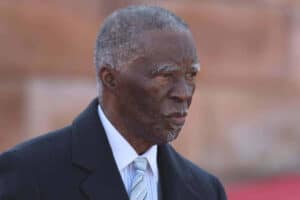Last week was not the first time Zuma boasted about being aware of the corruption of others, only to have done nothing about it.
Reports from last week that former president Jacob Zuma warned his detractors not to “provoke him”, or he’d expose their dirty dealings, appeared to backfire on Zuma after experts pointed out that he had a legal obligation to report any wrongdoing he was aware of while he was president.
Ahead of the resumption of his court trial on Wednesday, which was once again postponed on Friday, Zuma quietly threatened his critics not to push him too far.
He implied that now that he’s no longer president of the ANC or the country, nothing was holding him back from exposing the secrets of others in politics, especially those who criticised him.
He said: “There are people who like to talk about me, who are provoking me, and I have been keeping quiet when I was the president of the country in respect to them. And it’s not like I don’t have anything to say,” said Zuma. “I’m now not having responsibility of a president … and I want to warn them, they must keep quiet. They must discuss their organisation, not me.
“Because I have things to say about their organisation and themselves. I don’t want to do so because I think I know why I am part of the struggle; why I’m part of the leadership.”
Slowing down for emphasis, he added: “They must not … provoke … me.”
Although Zuma did not mention the ANC directly, it was obvious he was referring to his detractors in his party, as well as the outspoken and highly critical alliance partner the SACP.
The next day, addressing a big crowd of supporters after court proceedings, Zuma then also accused his detractors of being corrupt.
“Some say that I’m corrupt. I know some of them; they are also corrupt. I’ll talk about their corrupt activities too. They should not think that they have a right to say anything about anyone. If they continue talking about me, they’ll get what’s coming to them,” he reportedly said in a speech largely issued in isiZulu.
Analysts have, however, pointed out that Zuma may have got it completely wrong, because his comments suggest that he thought he had an obligation to cover up the corruption of his colleagues when he was president, when the exact opposite was always the case.
He would need to tread carefully in trying to expose others, lest he shoot himself in the foot in the process. Some have now called for Zuma to be charged in some way for, in effect, admitting to covering up corruption.
A case of déjà vu
However, none of this should be seen as anything new, as Zuma in effect admitted to much the same thing already in November 2016, while he was a sitting president.
EFF national chairperson advocate Dali Mpofu pointed out at the time that Zuma had inadvertently confessed to breaking the law while giving a televised speech.
The then president claimed that he had full knowledge of who was in fact stealing from the public purse – but instead of doing anything about it, he told the crowd he was “just watching them. I know them.”
Speaking mainly in isiZulu at an ANC cadres’ forum in Pietermaritzburg, he attempted to deflect from accusations of his own alleged theft and corruption by saying “they have investigated me all over but they are finding nothing because I’m not doing anything”.
While Thuli Madonsela was still public protector and investigating allegations of state capture by the Gupta family, she raised the concern – which will now need to be investigated by the judicial commission of inquiry into state capture – that Zuma was made aware of his friends the Guptas’ alleged attempts to bribe members of Zuma’s Cabinet.
According to the laws governing all public officials, Zuma was meant to report that matter as soon as then ANC MP Vytjie Mentor made him aware of it, and have it investigated. However, he allegedly ignored it. He will need to prove that Mentor was lying when she claimed she had told him the Guptas had allegedly tried to influence Cabinet appointments. They did the same thing, allegedly, by promising the then deputy finance minister, Mcebisi Jonas, the finance minister job.
When Madonsela tried to ask the president questions about that matter, he refused to answer and later attempted to interdict her report by claiming she hadn’t given him enough of a chance to state his side.






